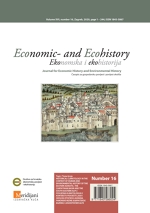Seeing, Sensing, and De/Scribing – Narratives on Weather and Climate in Preindustrial Serbia and Bosnia-Herzegovina
Seeing, Sensing, and De/Scribing – Narratives on Weather and Climate in Preindustrial Serbia and Bosnia-Herzegovina
Author(s): Jelena Mrgić, Bogdan DražetaSubject(s): Energy and Environmental Studies, Human Ecology, Environmental interactions
Published by: Društvo za hrvatsku ekonomsku povijest i ekohistoriju - Izdavačka kuća Meridijani
Keywords: narratives; weather; climate; preindustrial era; traditional ecological knowledge (TEK); Serbia; Bosnia-Herzegovina;
Summary/Abstract: Over the past five decades, there has been a steady increase in paleoclimatic and historical climatological research in Europe and beyond, emphasizing the need for mathematical calibration of data, both natural and manmade, in order to produce reliable scales and cycles of climate change patterns. To a lesser extent, attention has been paid to people as living beings, sensory creatures, that is, less rational and predictive than climate scientists would like them to be. This paper is dedicated to the sensual, emotional but also practical and cautious side of human nature, to the people who gather experience through generations, so as to increase resilience of their families and communities when faced with short, medium or long-term weather events and climate change. Data for Serbia and Bosnia-Herzegovina have so far fit the models of ‘typical’ preindustrial societies, in which agriculture and animal husbandry provided the livelihood for the vast majority of the population. Christian culture shaped the fears expressed in short marginal notes and Franciscan chronicles, but since the 15th century, urban and rural society included the Muslim culture and worldview as well. With periods of feudal, civil, and Austro-Ottoman wars, the spread of epidemics, a climate of violence emerged, producing dire consequences, such as heightened sensitivity, anxiety, and uncertainty, contributing to existential crises. Beside these tales of fear, oral testimonies provide a treasure of traditional ecological knowledge (TEK), which helped people cope with great uncertainty and explain their own social-cultural realities. This will be re-evaluated through our ethnographic material in various areas of Serbia and Bosnia-Herzegovina.
Journal: Ekonomska i ekohistorija - Časopis za gospodarsku povijest i povijest okoliša
- Issue Year: 2020
- Issue No: 16
- Page Range: 184-200
- Page Count: 17
- Language: English

